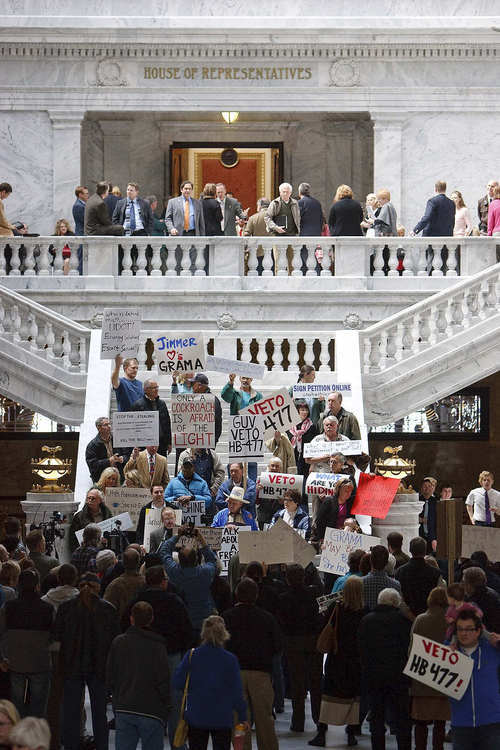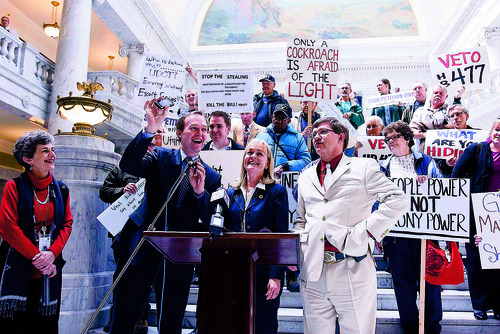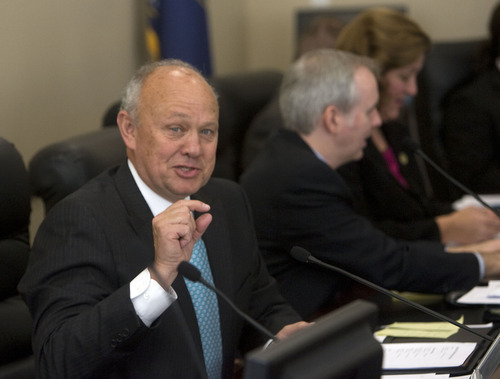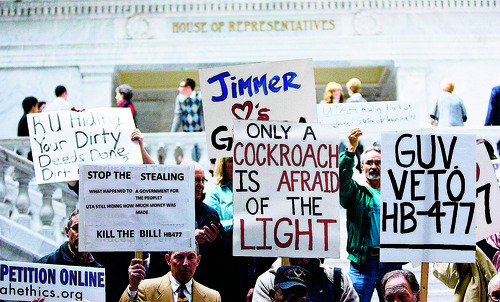This is an archived article that was published on sltrib.com in 2011, and information in the article may be outdated. It is provided only for personal research purposes and may not be reprinted.
Lawmakers and lobbyists have relied on a handful of examples to make the case that Utah's Government Records Access and Management Act (GRAMA) should be revised to prevent fishing expeditions and deal with requests that are burdensome and costly.
Among the examples raised in floor debates, on lawmakers' blogs and in presentations to the GRAMA Working Group: a request for a million-plus records, one for 30 years' worth of land-use decisions, and a request for files from 60 percent of one city's employees.
Are the claims accurate? Keep reading for the rest of the story.
The $30,000 request
The claim • The Senate blog used a GRAMA request received by West Valley City as an example of a time-consuming, massive records request. According to the blog, the city received a GRAMA for "all land-use decisions over the past 30 years, which took one full-time person three months, with other staff involved, to fulfill." The cost to the city: $30,000.
The rest of the story • After the story surfaced, West Valley City Mayor Mike Winder, relying on information from City Manager Wayne T. Pyle, posted a comment on his Facebook page disputing that the city had ever received such a request. Pyle later had to correct the record again.
"As it turns out, the information I gave him was wrong," Pyle said. "A GRAMA request of this nature did indeed happen a number of years ago."
A developer, whom Pyle declined to name, and the city were locked in a dispute over a potential residential development. The developer submitted a "very broad" records request in spring 2003 that the city estimated would cost $60,000 to fulfill, according to Pyle. The city and developer negotiated over records and fees. By early 2004, the developer had narrowed his request and agreed to pay $10,000 for the records, which amounted to thousands of pages, even though Pyle said the city estimated at that, in terms of labor and production, the real cost was $30,000.
"That was what we were able to negotiate," Pyle said. "Basically, we just felt, given the structure of the GRAMA law at the time, that was the best we were going to be able to get."
Pyle said the incident "involved a whole lot of effort in trying to comply with the request, which obviously stretches your resources."
Most records requests aren't that complicated, he said, but the demand is steady. In 2010, the city's police department received 12,686 GRAMA requests. Pyle said Police Chief Thayle "Buzz" Nielsen estimates that, on an annual basis, it takes the time of 1½ clerks to respond to and fulfill GRAMA requests.
A million records
The claim • According to the Senate blog, one city received a GRAMA for its entire parking enforcement data since 2000, a request totaling 1 million-plus records. Lincoln Shurtz, lobbyist for the Utah League of Cities and Towns, told the GRAMA Working Group that the requester refused to narrow the request when asked to by the city and, when pressed, said he was actually looking for records related to one vehicle.
The rest of the story • In January, Salt Lake Tribune reporter Nate Carlisle requested "the complete parking ticket database," including outstanding and paid tickets, from Salt Lake City. He asked that the city provide the data in a Microsoft Excel spreadsheet.
The city asked Carlisle in an email to provide specific dates he wanted covered in his request. Carlisle then wrote the city that, if possible, he wanted "the entire database of parking tickets spanning the history of the justice court." The city again pushed for a more specific time frame, and Carlisle requested records from July 1, 2002, to Jan. 11, 2011.
In mid-January, Charleen Sylvester, who works in the mayor's office, asked Carlisle to specify what kind of information he wanted. The reporter asked for name, date, location where a ticket was issued, time, vehicle description data, home address of the offender (or city or ZIP code), the offense, ticket amount and whether the ticket was paid or outstanding.
About 10 days later, Sylvester informed Carlisle the city was working on his request and that there would be an unspecified charge.
"I feel at this point it will be at least $50," Sylvester said in a Jan. 20 email. "We have to build a worksheet through our system for nine years worth of data. It's not an easy task."
While waiting for the city to respond, Carlisle used parking ticket data given to another Tribune reporter to write a story on top parking scofflaws.
"I did tell [a city employee] I was working on that story, and somehow that got interpreted as though it was the only story I was working on with respect to the database," Carlisle said.
On April 8, the city provided Carlisle with a spreadsheet listing "all outstanding parking tickets in the system." It is unclear if the city will provide the rest of the data.
City Attorney Ed Rutan said that, based on his understanding of the request, it clearly could be considered "voluminous." Sylvester said Carlisle requested 138,459 kilobytes of data, which is accurately described as more than 1 million records. That's equivalent to 69,250 typewritten pages, but Carlisle says the size of the request is immaterial.
"Critics of my request are focusing on the number of records, but the number is irrelevant. The data is stored electronically. If you can export one record, you can export a million," he said."I requested a database of parking citations for legitimate news stories about parking in Salt Lake City."
Sylvester said that to fill the request, a city employee has to go through the list "by line item" to determine whether any information needs to be redacted from citations that have not yet gone through small claims court.
"We try to narrow these things down to what you really need," Rutan said. "The idea here is, why should the city have to go through any effort that is unnecessary because someone has been overbroad in asking for what they really need?"
Regional sports complex
The claim • The Jordan River Restoration Network filed a GRAMA request for all communication related to Salt Lake City's proposed regional sports complex. Lincoln Shurtz of the Utah League of Cities and Towns told the GRAMA Working Group that the request required the city to review documents kept by 60 percent of the city's employees. The city asked the organization to narrow the request, but the organization did not respond.
The rest of the story • In January 2010, the Salt Lake City Council voted to proceed with a proposed regional sports park complex, approved by voters in a 2003 bond election. The Jordan River Restoration Network, which opposes the project, filed a 3½ page, single-spaced GRAMA request with the city on March 10, 2010. The network's request spanned eight years and sought 21 categories of documents related to the complex. It also asked for a fee waiver.
Six days later, the city denied the fee waiver and said it couldn't fill the request within the 10-day period allowed by law.
The organization appealed to the Salt Lake City Record Appeals Board, which approved the fee waiver but gave the city an additional 45 days to respond because of the "voluminous" scope of the request.
Both the city and the Jordan River Restoration Network then appealed to the State Records Committee — with the city objecting to the fee waiver and the network objecting to the extended response time, which would preclude it from reviewing documents in time for public hearings on the complex.
During the appeals hearing before the State Records Committee last June, the city characterized the GRAMA request as a "fishing expedition" intended to help the network block the project through litigation. It said 60 past and current city officials' files would need to be searched — not files of 60 percent of all employees.
The records committee was told many of the requested records were held by one individual: Rick Graham, public services director. Given that, the committee said the city's request for more time was "unreasonable." It gave the city a week to turn over some documents and 30 days to deliver the rest. The committee also affirmed the fee waiver.
By mid-June, Jeff Salt of the Jordan River Restoration Network had received 4,500 pages of documents.
At that point, Salt Lake City informed the network it was withholding some records as protected or privileged; the network appealed that decision to the city's board and then, after losing, to 3rd District Court. The city also filed an appeal in 3rd District Court over the fee waiver given to the network. The records appeal is still pending.
"This case is not about access to documents. It never has been," the city said in one court filing. "It's about who pays the cost of that access — the JRRN or the Salt Lake City taxpayers."
"The starting point under GRAMA is that the JRRN is not entitled to even have the city start searching for documents until it agrees to pay the standard fees," the city said.
Art Raymond, deputy director of communication, said the city can't comment because of ongoing litigation with the Jordan River Restoration Network. But in a document filed in the case, City Attorney Ed Rutan estimated four city employees had spent a total of 119 hours — equivalent to three employee weeks — locating and copying 9,500 pages of documents for the network. He estimated the duplicating cost was $950.
"It is a breach of public trust for the JRRN to refuse to consider ways to reduce the cost to the city and thus the taxpayers," the city said in an Aug. 16 filing.
"We did make a broad request," Salt said. "It is a necessity sometimes to make broad requests to get to the bottom of who government officials are speaking with and what deals are being made. … We had no idea what was in those documents that would be of interest to the public or relevant to hearings we were interested in."
Salt said delays and appeals are "a game" local governments play to tie up a request until the matter is moot.
"As a result of the appeals, we've been denied our constitutional right to participate meaningfully and be heard," he said.
Twitter: @Brooke4Trib —
What's next?
The GRAMA Working Group meets Wednesday at 9 a.m. in the Senate Office Building Room 210. Watch the meeting live. • gramarevisited.com —
Editor's note
This article is part of a series of occasional stories examining claims and issues raised in the public debate over Utah's open-records law.









